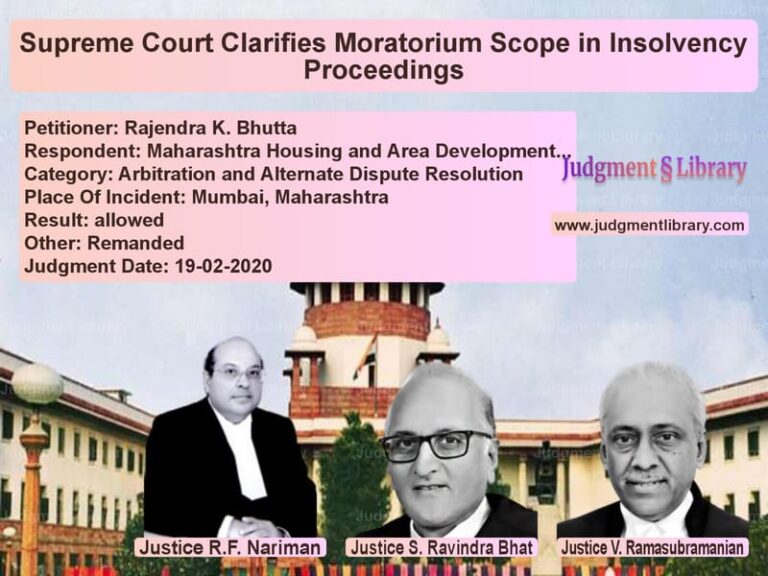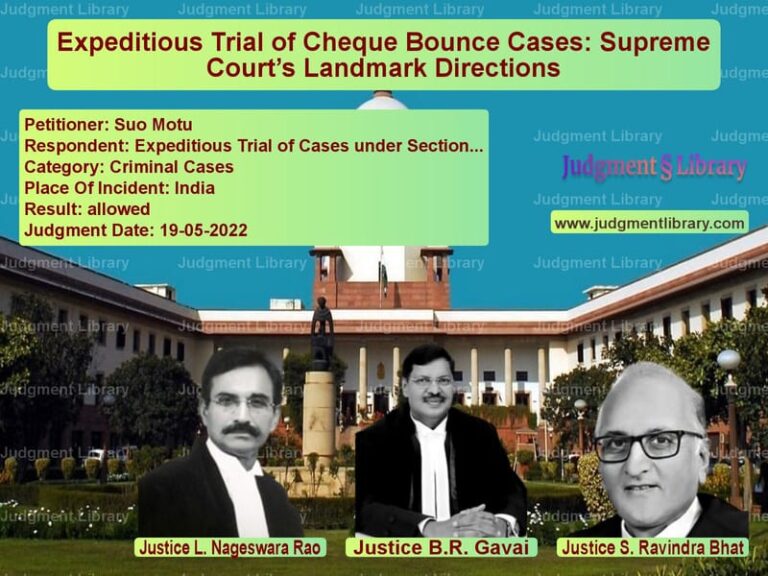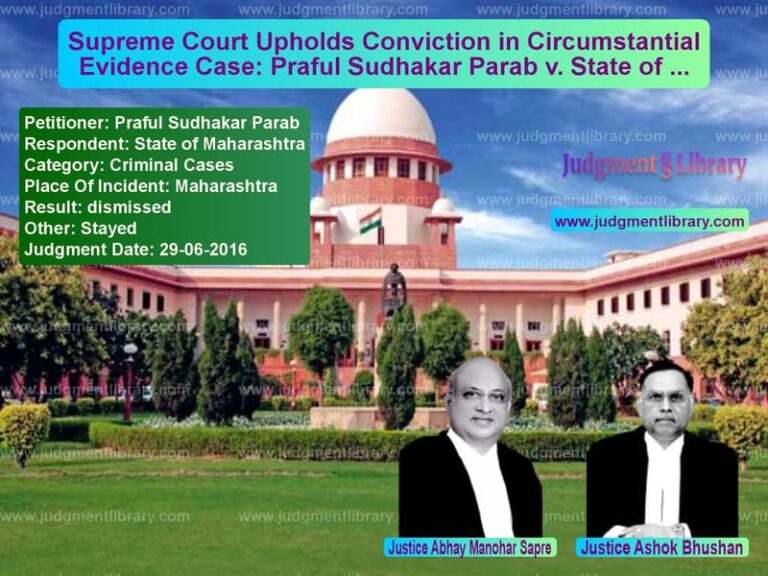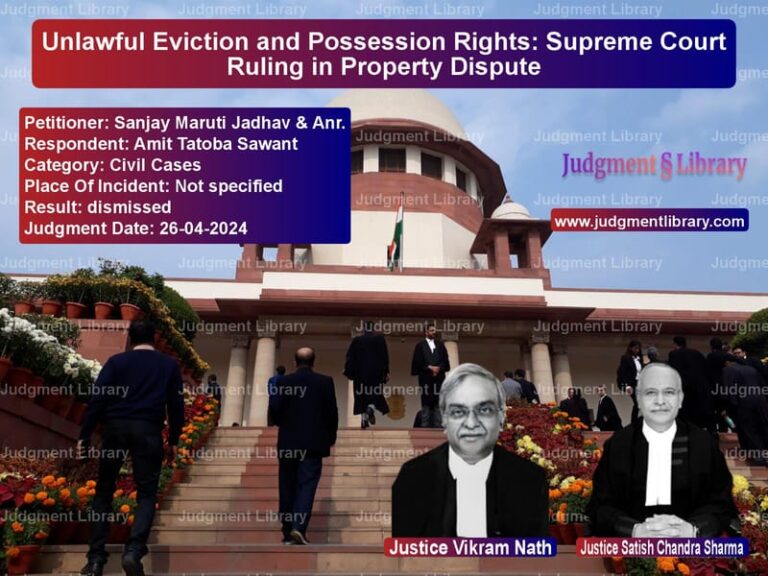Supreme Court Clarifies Land Acquisition Law: Compensation and Possession Under Section 24(2)
The case of Government of NCT of Delhi vs. Ratiram & Ors. is an important ruling that clarifies the interpretation of Section 24(2) of the Right to Fair Compensation and Transparency in Land Acquisition, Rehabilitation and Resettlement Act, 2013. The Supreme Court overturned the Delhi High Court’s decision that had declared the land acquisition process lapsed due to non-payment of compensation, setting a precedent that possession of land remains a key factor in determining the validity of acquisition.
In its judgment delivered on January 20, 2023, the Supreme Court ruled that the acquisition had not lapsed and that the High Court had erroneously relied on Pune Municipal Corporation & Anr. vs. Harakchand Misirimal Solanki, a judgment that had been subsequently overruled.
Background of the Case
The dispute arose when the private respondents filed a writ petition in the Delhi High Court, arguing that the acquisition of their land had lapsed under Section 24(2) of the 2013 Act because compensation had not been paid. The High Court ruled in favor of the respondents, declaring the acquisition process null and void.
The Government of NCT of Delhi challenged this decision, arguing that:
- The land acquisition process was valid.
- Possession of the land had already been taken and handed over to the beneficiary department on March 21, 2007.
- The High Court incorrectly relied on a judgment that had already been overruled.
Legal Issues Examined
The case raised the following key legal questions:
- Does land acquisition lapse if compensation has not been paid but possession has been taken?
- What is the impact of the Supreme Court’s ruling in Indore Development Authority vs. Manoharlal & Ors. on pending land acquisition cases?
- Was the High Court’s reliance on Pune Municipal Corporation justified?
Arguments Presented by the Government of NCT of Delhi
The government argued that:
- The High Court’s decision was based on an incorrect legal premise.
- Possession of the land had already been taken in 2007 and handed over to the relevant authority.
- Under the Supreme Court’s Indore Development Authority ruling, land acquisition does not lapse merely due to non-payment of compensation.
- Since the Supreme Court had overruled Pune Municipal Corporation, the High Court’s judgment was invalid.
Arguments of the Private Respondents
The private landowners argued that:
- They had not received compensation for their land.
- According to Section 24(2) of the 2013 Act, the acquisition should be considered lapsed.
- The High Court had correctly interpreted the law in their favor.
Supreme Court’s Observations
The Supreme Court, comprising Justice M.R. Shah and Justice C.T. Ravikumar, emphasized that the High Court had misapplied the law. The Court ruled that:
“The decision rendered in Pune Municipal Corporation is hereby overruled, and all other decisions in which it was followed are also overruled.”
Key Legal Findings
The Court made the following determinations:
- Possession of land is a crucial factor in determining whether the acquisition remains valid.
- If possession has been taken, the acquisition does not lapse even if compensation has not been paid.
- The High Court’s reliance on Pune Municipal Corporation was incorrect because that judgment had already been overruled by the Supreme Court in Indore Development Authority.
- The acquisition process remains valid, and the original writ petition by the private respondents was dismissed.
Impact of the Indore Development Authority Judgment
The Supreme Court’s Indore Development Authority vs. Manoharlal & Ors. ruling clarified several important aspects of land acquisition law:
- Non-payment of compensation alone does not result in lapse of acquisition.
- If possession has been taken, the acquisition remains valid.
- Legal challenges based on the earlier Pune Municipal Corporation ruling are no longer valid.
Final Verdict
The Supreme Court ruled that:
- The High Court’s judgment was quashed.
- The land acquisition had not lapsed.
- The writ petition filed by the private respondents was dismissed.
Implications of the Judgment
This ruling has significant implications:
- Legal Clarity: Ensures uniform interpretation of land acquisition laws.
- State Authority: Strengthens the government’s ability to retain land acquired for public purposes.
- Reduced Litigation: Prevents misuse of legal loopholes to challenge land acquisitions.
Conclusion
The Supreme Court’s decision in Government of NCT of Delhi vs. Ratiram & Ors. upholds the integrity of the land acquisition process and provides clarity on Section 24(2) of the 2013 Act. The ruling reinforces that possession of land is a decisive factor in determining the validity of acquisition, preventing landowners from using technical grounds to reclaim acquired land.
Read also: https://judgmentlibrary.com/supreme-court-overrules-delhi-high-court-in-land-acquisition-dispute/
Petitioner Name: Government of NCT of Delhi.Respondent Name: Ratiram & Ors..Judgment By: Justice M.R. Shah, Justice C.T. Ravikumar.Place Of Incident: New Delhi, India.Judgment Date: 20-01-2023.
Don’t miss out on the full details! Download the complete judgment in PDF format below and gain valuable insights instantly!
Download Judgment: government-of-nct-of-vs-ratiram-&-ors.-supreme-court-of-india-judgment-dated-20-01-2023.pdf
Directly Download Judgment: Directly download this Judgment
See all petitions in Property Disputes
See all petitions in Compensation Disputes
See all petitions in Landlord-Tenant Disputes
See all petitions in Judgment by Mukeshkumar Rasikbhai Shah
See all petitions in Judgment by C.T. Ravikumar
See all petitions in allowed
See all petitions in Quashed
See all petitions in supreme court of India judgments January 2023
See all petitions in 2023 judgments
See all posts in Civil Cases Category
See all allowed petitions in Civil Cases Category
See all Dismissed petitions in Civil Cases Category
See all partially allowed petitions in Civil Cases Category







